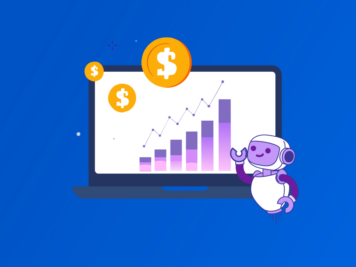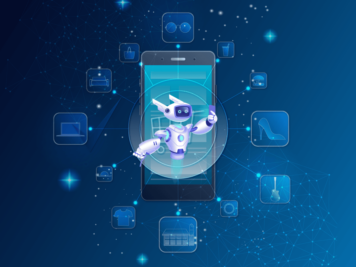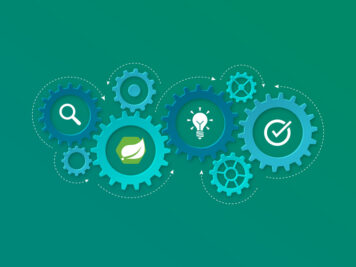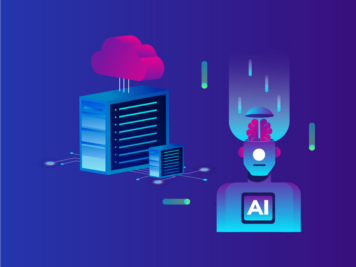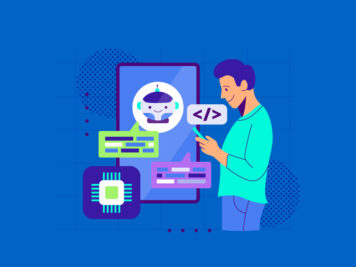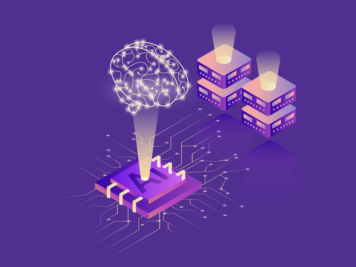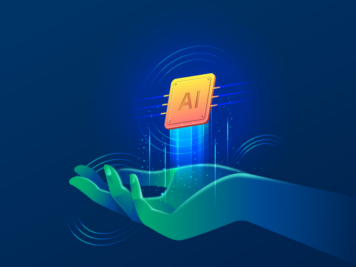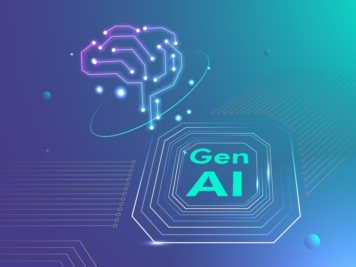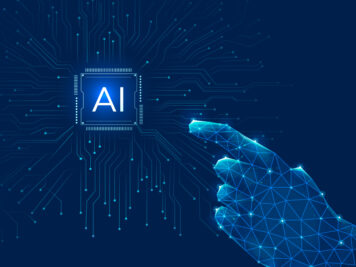Industries are experiencing a digital transition at an unprecedented pace where businesses are becoming smarter, and more efficient. Thanks to AI use cases across major industries. Leaders have started seeing AI as critical to their future success, impacting everything from operations to strategy. However, effective AI implementation requires more than just technical know-how. It also requires foresight, strong leadership and a culture ready to adapt.
AI improves itself by mimicking human actions. There are areas such as image classification and language comprehension where AI outperforms humans, but it still lags in areas like complex thinking, reasoning and planning. However, the tools are evolving fast alongside the AI use cases. New multimodal models like GPT-4 exemplify AI’s capability to tackle tasks across various domains. Yet, as benchmarks rise, data quality and human evaluation become increasingly important, pushing AI into new terrain.
So far, AI has had a resounding impact on industries like banking and finance, healthcare, automotive, communications, manufacturing, defense and military, entertainment and media, education, and more. It is opening up future avenues as well, which means we are all set to witness more innovations in the coming years. But before you start implementing AI into your business, identify how AI can impact your business first. Also, you should be aware of the right approach to implementing AI in your business for the best results.
This blog covers all the top AI use cases spanning healthcare, marketing, retail, and more. Let’s check them out.
Exploring top AI use cases by industry
According to the State of AI 2024 Report, the enterprise value of AI companies has increased to $9 trillion, demonstrating the massive economic impact and rapid use of AI technology across industries. The report also highlights that AI-driven innovations have resulted in increased efficiency across various business operations. This widespread implementation of AI is revolutionizing industry operations, resulting in significant increases in productivity and innovation.
Top AI use cases in healthcare
Just compare the time taken to develop vaccines for Influenza and COVID-19. In the former case, researchers spent a decade to come up with the one after the virus surfaced, whereas, for the latter, they took less than a year to produce multiple. And it is AI that made the difference.
The vaccine is not the only field where AI is making significant progress, and there are multiple other benefits of using AI in healthcare. It has impacted many more like oncology, where Deep Learning is doing well in identifying cancer cells. Other areas like personalized medicines to smart wearables are also leveraging AI features to create better use cases.
This change is visible in the predicted growth of AI in the healthcare sector. According to a recent analysis by IMARC Group, the global healthcare AI market is expected to reach $57.2 billion by 2032, representing a CAGR of 27.4% during 2024 and 2032.
DeepMind and Google’s innovative work with Med-Gemini is another factor supporting this growth. According to Google researchers, this innovative model, which is still in development, is based on the existing Gemini model and exceeds industry standards.
Med-Gemini outperforms other large language models in complex medical reasoning. It does this by combining excellent reasoning skills with access to current medical information and the ability to easily search the Internet. This adaptability allows it to respond to new data and achieve high precision.
The industry is going to benefit from the rapid percolation of Machine Learning (ML), Natural Language Processing (NLP), and Deep Learning (DL) into different healthcare subsectors. Few such AI usecases in healthcare are:
Top AI use cases in healthcare can be broadly classified into three categories:
Product-centric
This category focuses on artificial intelligence tools that help in the early stages of drug discovery and development. Here is how AI is helping or can help:
Drug discovery and research
Artificial intelligence (AI), specifically generative AI, is proving to be an effective weapon in the battle against disease. AI can analyze huge databases to identify existing compounds with potential therapeutic uses, as well as forecast the structure and effects of new infections, helping researchers plan for future risks. This new technique has accelerated the entire drug development process.
Companies like Etcembly are making history by employing generative AI to develop the first AI-designed immunotherapy drug. This real-world success story highlights the enormous potential of AI to change the field of medicine by delivering novel and potentially life-saving medicines to patients faster than before.
Adding to this, Stanford Medicine researchers created SyntheMol, a revolutionary AI model that works like a virtual chemist. SyntheMol sifts through huge volumes of data to find and develop potential new drugs that target precisely these antibiotic-resistant bacteria. This gives researchers potential leads to synthesize and test in laboratories.
Beyond SyntheMol, a substantial partnership between Sberbank’s AI Lab and pharmaceutical company R-Farm resulted in the development of another innovative AI solution. Traditionally, designing the molecular structure of a new drug was a time-consuming procedure, often years of precise work.
This new AI tool speeds up drug development phase, potentially reducing the projected duration from three years to just two months. This important acceleration opens the door to the faster creation of new medicines that can save lives.
The advent of hybrid quantum generative AI models has made the future of AI-driven drug discovery even more promising. These models combine the power of classical and quantum computing, giving researchers a more powerful tool for drug development. Early results with this technology, particularly in creating potential new cancer drug candidates, point to a future in which artificial intelligence can greatly accelerate the identification and development of successful drugs.
Clinical development
Life sciences companies are using AI to improve clinical trial operations. This involves identifying optimal trial sites and effectively recruiting and retaining participants, with the goal of dramatically reducing the current average 17-year timeline for getting new drugs to patients.
A recent example is Insilico Medicine’s AI-designed COVID-19 drug, which has reached Phase I clinical trials and represents a promising new weapon in the fight against the virus. The combined power of AI in drug discovery and development is transforming healthcare and moving us closer to a future of faster, more precise therapies.
Additionally, Google DeepMind has released a new version of AlphaFold, a revolutionary AI tool for predicting protein shapes. This achievement enables AlphaFold to make substantial discoveries in biology and clinical research.
Patient-centered
This category includes AI-enabled products that are patient-centered and intended to improve health outcomes. These tools empower patients through:
Personalized treatment
Algorithms can predict how a person will react to certain therapies. This allows doctors to make data-driven decisions and personalize treatment strategies for the best results. AI augments, rather than replaces, healthcare professionals.
Patient education
Conversational AI technologies make health information more accessible. Patients can better understand their own illnesses, a family member’s illness, or preventive measures to stay healthy.
Generative AI is also playing a vital role in assisting healthcare education. Provides reliable health information and maintains appropriate treatment levels. It’s like having an educated friend who can provide you with accurate health data as needed.
Prior to the widespread use of ChatGPT, 94% of US healthcare customers reported searching for health information on the Internet. Generative AI addresses this gap by providing reliable and easily accessible information.
Early diagnosis
Artificial intelligence, particularly in medical imaging, can diagnose diseases such as cancer more quickly and accurately than human specialists. New potentials are being studied, such as using speech analysis to diagnose heart failure, depression and possibly COVID-19. Regulatory permission is still required for many of these applications.
An interesting development is Sybil, a novel artificial intelligence tool jointly developed by the Massachusetts Institute of Technology and the Mass General Cancer Center. Sybil analyzes medical scans and claims to be able to predict a person’s chances of getting lung cancer over the next year with an astonishing 86% to 94% accuracy. This level of precision has the potential to save lives through early detection and treatment.
Beyond cancer, AI has shown potential to identify other diseases. A recent study published in Frontiers demonstrates the potential of AI-based early diagnosis of congenital heart disease in babies. These technologies can transform diagnostics, increasing accuracy and efficiency while allowing healthcare professionals to spend more time caring for critically ill patients.
Disease management interventions
Generative AI can help doctors and patients better manage diseases by analyzing medical information in real time, detecting anomalies, and predicting outcomes. During the first year of medication, up to 60% of patients with chronic diseases skip doses, take the wrong dose, or discontinue treatment. Generative AI can be an invaluable resource in solving these obstacles.
Improved adherence
AI-powered digital health products are more than just reminders. They can evaluate data to anticipate the possibility of patients discontinuing therapy and recommend preventive measures, resulting in better adherence and, eventually, better health outcomes.
Co-pilots for patient triage
Generative AI acts as a co-pilot in patient triage, helping to determine where to direct them for diagnosis or treatment. It allows healthcare professionals to safely stratify patients entering the healthcare system and direct their care appropriately. This is critical in the first mile of navigating patient care, ensuring patients receive the right care at the right time.
Population-centered
This category focuses on health at the population level and offers tools to improve care delivery and health care system operations. Here is how AI is helping or can help:
Optimizing care operations
AI-powered automation and administrative technologies help healthcare professionals. These tools can forecast and prevent fraud, improve workforce levels, and eliminate waste, resulting in lower healthcare expenses.
Healthcare informatics
Artificial intelligence (AI) can evaluate large volumes of patient data within hospital systems. This allows for more effective public health management and the development of personalized interventions. International teams are also exploring AI to forecast disease outbreaks, which can help with pandemic preparedness.
Care delivery
AI applications range from sophisticated robotic surgery to common tasks such as conversational AI for patient triage. These techniques increase the efficiency and accessibility of health services to entire populations.
Top AI use cases in education
Education is a sector that was a little slow in adopting technological advancements, and when the pandemic hit, things started to look vulnerable. The sudden shift to online learning due to the COVID-19 exposed many flaws in the education systems.
The pandemic years have triggered a massive global surge in technology adoption in education and transformed the teaching and learning landscape. Over 47% of learning tools will be empowered with AI in the next three years to customize the experience of various learning groups, teachers, and tutors. This growth is propelled by the growing number of educators who now rely more on virtual learning.
AI is making quality education more efficient and affordable. In the near future, it can impact the lives of billions of people across the globe. Few such impactful top ai use cases in education are mentioned below:
Improving administrative activities
Grading and assessment require accuracy and fast response, which AI can deliver by automating basic administrative activities like reviewing multiple-choice questions, doing fill-in-the-blanks, and more. These can free up educators from secondary tasks and focus more on the academic excellence and personality development of students.
Developing personalized learning
Every student is different and so are their needs for the learning pace, methodology, and aspirations. AI-powered education models can help teachers to plan customized learning plans for individual students. AI-powered Edtech platforms can identify the knowledge gaps and suggest possible customized learning routes and track the progress.
Top AI use cases in automobile
Thanks to AI, automated driving is no longer a figment of imagination. Automobile manufacturers have made significant progress in the area, and it is fast becoming a part of the mainstream market.
The global inclination towards AI for vehicle manufacturing is set to push the global autonomous cars market size to $11.03bn by 2028 at a CAGR of 31.3% during the forecast period 2021-2028. Moreover, makers are now adopting AI-backed methods to build personalized units for a better user experience, which can further bolster growth. Some top ai use cases in automobile are mentioned below:
Sensor data processing & path planning
Better path planning can mitigate traffic hassles by optimizing vehicle trajectory. AI’s intelligent algorithms can help drivers navigate better traffic patterns and be on time. As a step toward safe driving, vehicles with advanced obstacle detection systems can detect and identify objects ahead and around them to avoid a collision.
Monitoring vehicle’s condition
Unwanted and sudden car breakdowns can be avoided with AI’s predictive maintenance. AI can help monitor the conditions of various car components and predict what can fail or go wrong and when.
Automating insurance claims
AI can analyze the vehicle’s data logs consisting of information related to the driver’s behavior on the road. At the same time, it can also predict the vehicle’s performance to alert the driver beforehand of possible accident scenarios, reducing the number of claims and expenditures. As for insurance companies, AI can provide trustable proof and this can significantly reduce the need for human involvement in claim processing plus it also can reduce false claims.
Top AI use cases in fintech
AI’s demand in helping the financial sector with fraud detection, security, operations, and more is growing exponentially. It will benefit more from the Fintech market’s possible valuation of $17.4 bn by 2027. Furthermore, its role in developing customer-centric products is vast as it controls several associated aspects like data collection and information analysis.
Here are some of the top AI use cases in financial services.
Fraud detection & compliance
The amount of money spent on fraud prevention is astonishing. AI can greatly reduce the cost by quickly analyzing millions of data points in seconds to spot anomalous transactional patterns. So, as soon as these suspicious activities are isolated, the system can check for any fraud. This saves both time and resources.
Data-driven client acquisition
Like any other sector, competition exists in the Fintech space too for selling their services to customers. AI-powered tools can leverage behavioral intelligence to obtain new clients by customizing offers to individuals based on their needs and pockets.
Accurate risk profiling
Credit scores are major deciding factors in lending loans. AI can provide real-time visibility of accurate credit scores associated with a borrower by analyzing the historical financial data, current liabilities, and many other risk parameters. This can help in deciding appropriate amounts, premiums, or interest rates for a loan while minimizing default risk.
Read also: 5 Top Use Cases of AI in Fintech
Top AI use cases in insurance
The insurance industry is standing on the cusp of a significant digital transformation as traditional business models give way to new standards like connected insurance, usage-based premiums, and intelligent underwriting. AI is at the heart of this change, and insurers can leverage it to engage with customers, optimize products and pricing, predict possible defaults, and more.
The insurance process comprises several manual tasks, which can be automated with AI and machine learning to ensure better efficiency and performance. Some top AI use cases in insurance are mentioned below:
Insurance lead scoring
AI can spot the most profitable insurance applications to optimize application reviews and focus more on lucrative customers to improve the conversion ratio. On a different note, by predicting the risk factor associated with a customer, insurance companies can mitigate risks by identifying a competitive premium.
Customize insurance policy
Manual policy customization is full of unwanted hassles. Insurance companies can make the process faster and more productive by automating it. Thus, it can make clients more independent in choosing the right policy covering what they need at the right premium.
Automatic claim processing
Claim management teams are often under pressure to determine the payout purpose, which can be streamlined with AI. It can improve the claim process by removing excessive human intervention, verifying provided proof, reporting false claims, and processing the payment.
Top AI use cases in marketing
The influx of good quality data can improve product marketing and increase a product’s reach to relevant consumers. Organizations must recognize and understand the needs of their customers to deliver a better experience and earn their loyalty. AI can simplify the process by identifying customer behavioral patterns and gauging the right time to engage customers.
More businesses are now adopting AI, which could eventually lead the AI in the marketing sector to a valuation of $40.09bn by 2025. To understand the AI in marketing, you can refer to one of our case studies where we helped a client manage 8 billion ad requests daily from 22 million a day with our AI solutions; read here.
Some of the top AI use cases in marketing include:
Search engines & chatbots
Technologies like Natural Language Processing (NLP) and semantic search are gaining traction. These can provide the users with highly relevant information on the search results pages, even if the words or sentences are misspelled or from broad queries. NLP-powered chatbots can interact like a human via text and resolve questions with 24*7 coverage. Such features can reduce the workload of customer support teams, social media, and community managers.
Customized ads
Online advertisement is a big market and more and more companies are using PPC ads to target the relevant audiences. AI can further improve audience targeting by predicting which customer segments are more likely to buy a product and then focusing the marketing budget on those segments. Further, AI can automate the A/B testing and multivariate testing to create real-time customized ads.
Product pricing
With the large volume of data available, organizations can study the demand and competition and influence prices in real-time. Similarly, AI can analyze customers’ willingness to pay for a particular product and compare a seller’s pricing model with its competitors to check where they stand. This has given significant advantages to e-commerce companies over those who are late in adopting AI.
Top AI Use cases in agriculture
Farming has witnessed quite a few technological revolutions since the beginning of agriculture. But the recent population boom has posed some serious challenges for the sector as the demand for global food production is expected to increase 50% by 2050.
AI-powered solutions can increase output by improving crop quantity and quality and ensuring faster go-to-market. The AI market in agriculture will leverage these positives to reach a possible valuation of $2.468bn by 2026, at a CAGR of 21.52% over the forecast period 2021 to 2026.
A glance at the top ai use cases in agriculture would reveal more.
Use of weather forecasting
Changing climatic conditions are gradually becoming a concern for farmers as it complicates identifying the correct time for sowing seeds. AI could help farmers analyze weather conditions beforehand by using weather forecasting features and planning activities accordingly.
Soil and crop health monitoring system
Specific AI-based applications can enable farmers to quickly identify nutrient deficiencies in the soil and determine steps to cure plants of pests and diseases. AI algorithms can also analyze crop health from images captured by drones.
Agricultural robotics
AI companies are now developing robots to perform various farming tasks efficiently, like plucking out weeds, sowing seeds, and harvesting a higher volume of crops than humans.
Top AI use cases in gaming
AI plays a pivotal role in the gaming industry. Its impact has grown multifold in recent years with the development of AR/VR and demand from industries where simulations are essential.
Gaming companies seek new technological solutions to develop better products and enrich customer experience. The sector is inspiring the massive incorporation of other AI-powered technologies in the process. The gaming market’s potential growth to a valuation of $398.95bn by 2026, at a CAGR of 11.0% during 2021-2026, will further trigger investment in AI.
It would be easier for you to understand how AI will impact if you dig deep into the breadth of top AI use cases in the gaming sector.
Voice intelligence
The use of voice has revolutionized the gaming industry. The inclusion of AI-driven voices and NLP is making games more lifelike. Assistance from such tools helps gamers focus more on the game instead of fiddling with external systems to do what they want.
Impact on illustration
AI has enabled gamers to interact with their surroundings more naturally. Illustrations in games now change with a shift in time or how gamers react. There are a lot of open-world games where AI is creating new areas with some pre-defined metrics.
Smarter mobile games
Mobile game developers are now exploring AI algorithms and machine learning technologies to make games more innovative and challenging.
Top AI Use cases in real estate
The real estate sector is leveraging artificial intelligence in buying, selling, and home financing. AI’s ability to collect, analyze and learn from a vast data flow makes the agents efficient, brokers strategic, and clients empowered with buying and selling processes. An example where a customer wanted to make investment decisions by leveraging AI solutions is projected here.
A report by CRE Innovation states that 49% of commercial estate executives believe in AI’s potential to curb cost and increase operational efficiencies. Such findings also firmly establish how secure AI’s future is in the sector.
Let’s look at how AI is impacting the real estate sector.
Transforming the home search procedure
The home search tools can now use the search criteria to determine users’ preferences and select properties based on those findings. AI algorithms can offer alternative listings to match the user’s expectations and place the best listings on top of the user’s search results.
Transactions streamlined
AI can take the workforce out of the data entry processes by offering customer relationship management (CRM) tools to auto-fill the data and generate automatic reports. It reduces the number of errors and the time taken for data-filling.
Property valuation
With AI’s ability to predict the future, real estate agents have started relying highly on it to assess a property and rental values. Applications with AI have an in-built automated valuation model that gathers data related to public records, transportation options, school district ratings, and crime rate statistics to offer an analysis of a particular property value.
Loans
AI and ML can impact the banking sector by simplifying the lending process in real estate. The method of lending loans involves a lot of paperwork, but, with AI the test process to read and determine the documents before transferring them to the underwriters can be made easy. However, this desktop test process does not entirely replace human work, but it is pretty fast.
Top AI use cases of in retail
The retail industry has been experiencing rapid advancement in online shopping. But it also faced severe challenges when the pandemic hit. Due to this, global retailers are now bolstering their businesses with AI capabilities to withstand any challenges and improve customer satisfaction. Their focus is more on AI’s ability to boost customer retention and drive sales by providing high customer engagement, better personalization, and support to the sales teams.
The global AI in the retail market is expected to reach $31.18 billion in 2028, at a CAGR of 30.5% in 2021-2028.
Some examples of real-world top AI use cases that are changing the retail sector are presented below.
Product recommendations
AI can analyze data based on a customer’s search history in the retail sector. Retailers can then use the extracted data to send automatic personalized recommendations to prospective customers. The automation feature in product recommendation improves the conversion rates, order values and offers better customer satisfaction.
Value-added customer service
AI-enabled in-store assistants can build a strong communication channel that answers customers’ queries. Combining the physical and digital storefront is becoming essential, and phygital retail can help in accomplishing this. Merging the best components of e-commerce to create a phygital experience involves the three I’s: immersion, immediacy, & interaction that would improve the customer experience and boost revenue.
Demand prediction & management
AI-powered demand forecasting helps inventory managers strategize and manage products. AI with ML-powered methods can perform demand predictions with high accuracy by understanding the seasonal trends. If retailers adopt this, they can easily predict the ups and downs in demand and avoid stock-outs.
Pricing strategy
The pricing strategy can be called one of the best applications of AI in the retail sector. Product pricing can be simplified with AI, which was a challenging task for retailers in the past. Also, deciding the best product price to attract customers becomes easier with AI.
Read also: A guide to implementing AI
Top AI use case in supply chain and logistics
Companies are increasingly using AI and data analytics to optimize their supply chains. A 2024 survey by Economist impact reveals a striking insight: 57% of businesses plan to invest in AI over the next year to streamline their supply chains, while 44% aim to integrate advanced automation technologies.
A glance at the top AI use cases in supply chain and logistics would reveal more.
Predictive analytics for demand forecasting
With AI, predicting demand becomes far more accurate. DHL reports that the use of AI in predictive analytics can boost delivery efficiency by up to 20%, helping businesses stay ahead of customer needs.
AI-driven predictive analytics analyzes historical data and other variables to forecast future trends. Walmart, for example, uses AI –driven demand forecasting to analyze past sales records, weather conditions, and consumer behaviors to project future product needs. This precision allows them to better manage their inventory, reducing stockouts and inefficiencies.
Automated warehousing solutions
AI-powered robots are revolutionizing warehouse operations. These robots handle tasks like picking and packing with speed and accuracy, minimizing human error and expediting order fulfillment. Companies like Ocado use AI-powered robots in their warehouses to handle tasks like picking and packing with remarkable speed and accuracy. Beyond that, these AI-powered robots also offer real-time inventory tracking, notifying employees when stock levels dip, preventing delays and ensuring smooth operations. As a result, businesses can respond to customer requests more quickly and accurately.
Enhanced route optimization
AI’s impact on last-mile delivery has been substantial with 39% increase in its adoption rate in 2023 alone. By processing real-time data on traffic, weather, and customer preferences, AI can create dynamic delivery schedules that reduce travel time and fuel consumption. This not only lowers costs but also ensures on-time deliveries. At the same time, the dynamic approach to route management helps businesses remain competitive in an increasingly demanding marketplace. For instance, UPS has adopted AI for its last-mile delivery operations, utilizing real-time data on traffic and weather to create dynamic delivery schedules.
Supply chain transparency
Transparency is key in supply chains, and AI helps achieve it by offering full visibility. Zara, for example, uses AI to enhance its supply chain transparency. It analyzes data from various sources to identify inefficiencies and ensure compliance. This boosts accountability and empowers both businesses and customers.
Top AI use case in travel and hospitality
In the travel and hospitality industries, where the goal is to create seamless and memorable consumer experiences, artificial intelligence has emerged as a vital tool. According to Statista, 39% of leisure tourists were satisfied with AI-generated suggestions in 2023-2024. Whether it’s discovering the best prices, exploring new places, or interpreting other languages, AI has made travel more efficient and personalized.
Here are some of the top AI use cases in the travel and hospitality industry.
Smart travel planning and assistance
AI is helping in smart travel planning by using data from past bookings, market trends, and external factors such as weather and local events to improve pricing strategies in real time. For example, platforms like Hopper use AI to predict flight prices and suggest the best time to buy tickets. Hotels and airlines are increasingly using dynamic pricing models, which modify rates to optimize occupancy and revenue. In addition to pricing, AI is used in predictive maintenance, especially in the transportation sector, where it predicts mechanical failures in cars and airplanes and fixes them before they disrupt travel plans. Delta Airlines has been using AI to predict maintenance needs for its fleet for quite some time now, aiming to minimize delays.
For travelers, AI offers travel planning and assistance, including booking assistance, travel suggestions and detailed itinerary planning. By quickly interpreting complex queries, AI can provide tailored suggestions, helping travelers make informed decisions and plan their trip efficiently. Google Travel is using this feature to provide personalized recommendations.
Enhancing customer experience
AI has transformed customer service in the travel industry. AI-powered chatbots and virtual assistants are available 24/7 and offer quick responses, making travel planning easier and more efficient. AI makes modifying bookings or getting quick answers fast, accurate, and hassle-free for consumers.
Baggage handling
AI has transformed a cumbersome process like baggage handling for both passengers and airlines. Today, AI-powered technologies automate baggage allocation and sorting, speeding up the check-in process and reducing the chance of human error. SITA Bag Journey is an app that has already made tracking of bags in real-time more efficient to ensure they reach their destination. Perhaps most importantly, AI-powered baggage tracking reduces the chance of lost or delayed baggage, providing peace of mind to travelers and making airline operations run more smoothly.
Advanced personalization
Personalization is AI’s strong suit, offering personalized travel suggestions based on data science and machine learning. For example, if a tourist searches for “hotels in Madrid,” subsequent results (whether on apps or websites) will include rooms in or around Madrid. Features like these have already helped giants like Airbnb revolutionize the way they expand their businesses. This degree of personalization improves the travel experience by offering travelers more relevant alternatives based on their particular interests.
Top AI use cases in media and entertainment
AI in media is shaking things up, creating amazing opportunities and making everything more efficient. AI is changing how we create, distribute, and consume content, boosting efficiency and opening up new revenue streams. Predictions say the AI in media market could hit $44.08 billion by 2028, so it’s time for everyone to adapt and make the most of these innovations.
Here are some of the top AI use cases in media and entertainment industry.
Smart recommendation engines
Smart recommendation engines, powered by AI, are revolutionizing the way we discover content. By understanding individual tastes and patterns, these recommendation engines can offer more relevant and targeted content, ultimately enhancing the overall user experience. This technology is helping users cut through the noise of endless options to find exactly what they’re looking for.
For instance, Netflix employs machine learning algorithms to analyze a user’s viewing history and preferences. By doing so, it generates personalized content recommendations that keep subscribers engaged. Similarly, Spotify’s “Discover Weekly” playlist uses AI to deliver custom-tailored music choices every Monday, enhancing user satisfaction and loyalty.
Programmatic ad buying
The way advertising space is bought and sold is undergoing a significant transformation. Programmatic ad buying, powered by AI algorithms, is streamlining the process for both advertisers and publishers. This technology utilizes algorithms to automate the entire process, from analyzing data to identify relevant audiences to purchasing and placing ads in real-time. This not only streamlines the process for advertisers but also significantly improves efficiency and effectiveness.
By analyzing data, programmatic ad buying can target the right audience at the right time. This ensures that ads are seen by those most likely to be interested, leading to a more engaged audience and a higher return on investment. This approach has become increasingly popular with digital media companies like BuzzFeed and The New York Times. Programmatic ad buying allows them to efficiently monetize their content through targeted advertising, while simultaneously providing a better user experience by eliminating irrelevant ads.
Content creation and editing
AI is not only impacting the way we consume media, but it is also changing the content creation process. AI-powered tools are being used to automate tasks such as video editing, color correction, and even scriptwriting.
For example, OpenAI’s GPT-3 language model has shown promising results in generating coherent text based on prompts provided by humans. This technology has been used by media companies like Forbes and The Washington Post to generate articles quickly and efficiently. Similarly, Adobe’s AI platform Sensei is being used to automate video editing tasks, making the process faster and more efficient.
AI’s impact on content creation extends beyond automation. Technology is also being used to identify trends and patterns in user preferences, allowing media companies to create content that resonates with their target audience.
Real-time predictive modelling for anticipating demand and segmentation
The ability to anticipate audience preferences and content demand is a goldmine for media companies. Real-time predictive modeling, powered by AI, is making this a reality. This technology analyzes data streams in real-time, allowing companies to understand viewership patterns and make informed decisions about content creation and distribution strategies.
One major benefit is the ability to segment audiences effectively. By analyzing data on demographics, viewing habits, and preferences, media companies can create targeted content for specific groups. This ensures content resonates with viewers, leading to higher engagement and potentially increased revenue.
Take Amazon Prime Video for example. They use AI to forecast viewership trends and predict which shows will be popular. This allows them to allocate resources efficiently, ensuring the right content is available when audiences want it.
Top AI use cases in manufacturing
Artificial intelligence is making manufacturing industry more efficient, sustainable and cost-effective. It has created new opportunities for automation, quality control and predictive maintenance, transforming traditional manufacturing processes. As AI-powered solutions become increasingly popular in the manufacturing sector, here are some of the most well-known and top AI use cases.
Quality control and inspection
Traditionally, quality control and inspection systems were manual, time-consuming, and resource-intensive, often leading to human error, manufacturing delays, and increased expenses. AI is automating these processes through computer vision systems that can detect problems quickly and accurately. These systems can evaluate massive amounts of data in real time, ensuring consistent quality and reducing the chance of human error.
For example, BMW has implemented AI-powered visual inspection systems in their production line to detect flaws in sheet metal parts with great accuracy, which has improved efficiency and reduced expenses for the organization.
Predictive maintenance
By using predictive analytics, companies can examine data from sensors and equipment and forecast when machines will need maintenance or parts replacement. This allows companies to plan maintenance in advance, reducing downtime and expenses associated with unexpected breakdowns.
For Instance, General Electric has implemented AI-powered predictive maintenance in their gas turbine power plants. By analyzing data from sensors, they can accurately predict when parts will need to be replaced, ensuring smooth operations and reducing downtime.
Autonomous manufacturing
Autonomous manufacturing systems require minimal human intervention. These systems use sensors, machine learning algorithms, and advanced robotics to perform activities such as assembly, packaging, and material handling. This not only improves efficiency, but also reduces the chance of human error and injuries.
Adidas, for example, has implemented a fully automated “Speedfactory” by using artificial intelligence and advanced robotics to make sneakers with minimal human intervention. This allows for better quality control, more customization options, and faster manufacturing times.
Conclusion
By exploring top ai use cases across major industries, we have already gained a clear understanding of Artificial Intelligence (AI) transformative potential.
AI has the power to transform the development of personalized medicines and therapies, optimize supply chains and improve consumer experiences. The ability to collect, analyze and learn from large volumes of data allows companies to make more informed decisions, improve efficiency and gain a competitive advantage.
The vast potential of AI presents a unique opportunity for startups. By building sustainable business model around specific AI solutions, startups can address industry pain points, create significant value for customers and maximize their benefits. But before adopting this new tool, they should make a business case around it to understand how they can impact and what possibilities they can explore in the future. Also, its successful integration requires careful planning. Assessing your existing technology stack and infrastructure is essential to determine the technical requirements for smooth AI implementation. This assessment will help you define a suitable software architecture that supports scalability, security, and ongoing maintenance of your AI solution.
We at Talentica are here to be your trusted AI partner. Since 2003, we’ve built 180+ tech products, including 30+ AI products for technology companies. Our AI engineering team comprises the top 2% of talent sourced from India’s premier engineering institutions (IITs/NITs/IISc). This ensures they bring in the best problem-solving skills to guide you through every stage of the development process effectively.
Explore our AI solutions today and discover how we can help you use AI to revolutionize your business. Schedule a call today! Or email us at info@talentica.com.
FAQs
What are some of the top AI use cases in software development?
AI can automate code reviews, identify bugs, generate code snippets, and even write basic test cases, freeing up developers for more complex tasks.
How is AI used in financial services?
AI is transforming finance by streamlining fraud detection, optimizing algorithmic trading, and personalizing financial products for customers.
Can you give some examples of top AI use cases by industry?
Absolutely! AI is making waves in various sectors, from healthcare (personalized medicine) to retail (predictive marketing) and manufacturing (robotic process automation).
What are some of the top AI use cases in IT operations?
AI can automate IT tasks such as server monitoring, network security analysis, and incident resolution, improving efficiency and reducing downtime.
What are the top AI use cases for generative AI?
Generative AI can create completely new content, such as writing different creative text formats, translating languages, and even generating realistic images and videos.
AI’s percolation across sectors is massive. Startups can build a sustainable model around it and maximize their benefits. But before adopting this new tool, they should make a business case around it to understand how they can impact and what possibilities they can explore in the future. Also, its integration can help assess tech requirements and determine a better software architecture.
